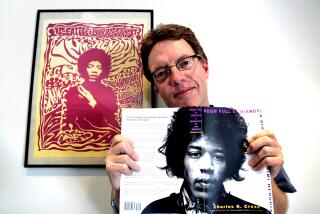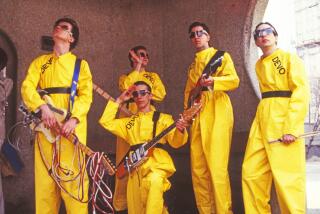Review: ‘Montage of Heck’: A sympathetic look at the life of Kurt Cobain
- Share via
Kurt Cobain and Courtney Love were goofing off at home when she asked him one of the most fundamental questions about his public perception.
“Why are you the good one and I’m the bad one?” she asked, teasingly, about how the media portrayed their stormy romantic relationship. “I used my illusion,” Cobain said, mocking the LP title from Guns N’ Roses, then-rivals to his rock band Nirvana.
Cobain’s witty self-awareness is one of many new and heart-rending sides of him brought to light in Brett Morgen’s new HBO documentary “Kurt Cobain: Montage of Heck.” Assembled over eight years with unprecedented access into the Cobain family’s private archives, Morgen has crafted an often brilliant, sometimes overheated but always humane documentary, one in which Nirvana’s music and fame is just the scaffolding to Cobain’s inner life.
But Cobain knew all about the fog that envelops life, art and public perception. “Montage of Heck” is revelatory in that it finds a whole new angle on one of rock music’s most beloved and well-documented figures. For all its intimacy, though, the film is also a reminder of just how contradictory and unknowable everybody is at heart, especially to themselves.
Even for the most die-hard Nirvana fans, there’s much in “Montage” that will surprise, delight and upset them all over again. Home movies show Kurt as a bubbly infant and irrepressible toddler (“He was always so worried about everyone, making sure they were OK,” according to his mom, Wendy O’Connor); and reams of notebook art and journal entries show the constant churn of his imagination.
Mid-career footage of Cobain and Love pantomiming angry fan letters and splashing in the tub with their baby daughter Frances prove that his loyalties to his embattled young family ran just as deep, perhaps deeper, than his commitment to Nirvana being the best rock band on the planet.
The film’s big revelations -- that Love admitted to briefly using heroin while pregnant with Frances, that Cobain made a previous suicide attempt as a teenager after an attempt to lose his virginity -- are treated deftly and quietly, as part of a larger, often impressionist picture of Cobain’s emotional life. Interviews with his father, stepmother and early girlfriend offer previously unheard perspectives that add depth to the total portrait (and Morgen should be justly proud for finally convincing them to speak on camera).
Morgen doesn’t spare the more difficult aspects of Cobain’s personality. A scene where he’s clearly battling symptoms of heroin use while helping Love cut his daughter’s hair is especially wrenching. But “Montage” is fundamentally empathetic, and unlike previous Cobain biographies like the tawdrier “Kurt & Courtney” or Gus Van Sant’s barely fictionalized “Last Days,” it doesn’t try to explain his eventual suicide -- an act whose motivations are always incomprehensible to anyone else.
“Montage” does trace an arc from Cobain’s difficult early adolescence, where he bounced around among family and friends’ homes after each grew exhausted from his presence, to an adult fear of disappointing his loved ones. For all the pseudo-romanticization of his image as an artist too sensitive for the world, the Cobain depicted in “Montage of Heck” really did want to live up to every hope and expectation he had for himself.
This film shows, more than any other Cobain document, his battle between total immersion in his art and family, and a deep-seated fear of failing both. At one point an interviewer asks about how literal Cobain was being when he wrote the song “I Hate Myself and Want To Die,” and his silent response is both funny and spine-chilling.
However some of the film’s technical elements don’t do justice to the once-in-a-lifetime access. Long animation sequences depicting his life in Aberdeen seem unnecessary, given how much visual information Morgen already had to work with. Sequences trying to depict Cobain’s crippling stomach pain with queasy gastrointestinal footage felt a bit gratuitous.
But Morgen wisely closed the film with a simple edit of Nirvana’s canonical MTV Unplugged performance of “Where Did You Sleep Last Night,” a folk standard popularized by Leadbelly but now indelibly linked with Cobain.
Given all that “Montage of Heck” showed up to that point -- the wild love and terrible loneliness, the impossible talent and the craving for acceptance -- the song again feels new and revealed. Much like its singer.
Follow me @augustbrown.
More to Read
The biggest entertainment stories
Get our big stories about Hollywood, film, television, music, arts, culture and more right in your inbox as soon as they publish.
You may occasionally receive promotional content from the Los Angeles Times.











